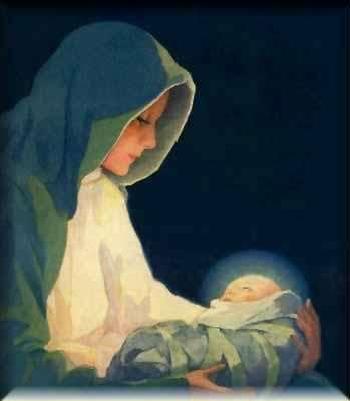Christmas: The day as an icon
(Originally published at What's Wrong With the World. Link to original post at 'permalink' below.)
 As secularists and neo-Puritans alike delight in pointing out, there is no strong reason to believe that Jesus was born "in the cold midwinter." Those silly traditional Christians, celebrating a holy day that is nowhere commanded to be celebrated in the Bible, probably has been attached by mere human convention to the historically incorrect time of year, and wasn't even recognized by the early church until, what?, 200 to 300 years after the time of Christ.
As secularists and neo-Puritans alike delight in pointing out, there is no strong reason to believe that Jesus was born "in the cold midwinter." Those silly traditional Christians, celebrating a holy day that is nowhere commanded to be celebrated in the Bible, probably has been attached by mere human convention to the historically incorrect time of year, and wasn't even recognized by the early church until, what?, 200 to 300 years after the time of Christ.
Yet, surprising as it may seem, God actually does care about human conventions. Does God care what you do with your wedding ring? Indeed, he does. For God knows that human beings, being made in his image, are by nature iconographers. We cannot help it. We habitually, irresistibly surround ourselves with symbols and images. We need symbols to remind, to prompt, and to move us. And the visible symbols make a difference to our bodies, our minds, and our souls.
This, presumably, is why God, repeatedly throughout Scripture, tries to harness the human tendency to make symbols. He tells his people to do physical, temporal things for remembrance. Set up these stones. Eat this feast on this day of this month. When your children ask you, "Why do you do these things?" be ready to tell them of the great things God has done, of which these are the markers. In the New Testament, God is still at it, now bringing symbol into the realm of Sacrament: Do this in remembrance of me. And the apostles and their followers begin, almost instantly after the Day of Pentecost, to meet and break bread on the first day of the week, when the Son burst forth from the darkness of the tomb. We find no record that God explicitly revealed to the Apostles that they should begin to worship on Sunday, but they did so naturally, as a matter of course, in celebration of the resurrection.
For man is a creature of the body and of the rhythms of the body, the seasons, and the years. And the God who made the body knows that we need to be reminded, reminded, reminded, in the cycles of the year, like the beats of the heart.
If we do not remember Christ's birth on some one day, we will not remember it on any day. Conscious remembrance and thanksgiving, for a time-bound creature, are activities that must occur at a particular place and time.
Would it be nice to know on what day, or at least in what time of the year, Our Lord was born and to connect our festival with those known seasonal facts, as we do with Easter? Certainly. To someone as historically and evidentially minded as I, it would be very nice. It would be highly satisfying to have the kind of solid historical evidence for the season of Christ's birth that we have for the Passover season of his death and resurrection.
But even though we don't have that knowledge, it does not follow that what the Gospels tell about the circumstances of Jesus' birth is a tissue of pious embellishment. Far from it. St. Luke's reference to the census is perhaps the most famous, and contentious, historical tie-down, but whatever final conclusion you come to concerning the nature of the census and the meaning of Luke's terminology, there is no question that Luke himself intended it to be a literal, historical explanation of the presence of Mary and Joseph in Bethlehem. Luke's love of such specificity is one of his most salient qualities. Compare chapter 3:1-2; the convergence of Tiberius Caesar, Pontius Pilate, Herod and Lysanias, and Annas and Caiaphas has been independently confirmed. And buried in the midst of Matthew's account of the flight to Egypt, complete as it is with a very Jewish typological reference to "out of Egypt have I called my Son," is this one little detail--that Joseph was afraid to return to Bethlehem when he learned that Archelaus was now ruling Judea. As pointed out by Esteemed Husband, the report of Joseph's qualms about settling in Bethlehem fits perfectly with what we know of Archelaus independently.
Thus the omission of indications of the time of year is just part and parcel of the normal messiness of literal, recorded history. Some things get mentioned; some things don't.
In the absence of specific information on that point, Christendom has made a season of days in the deep of winter into an icon of this literal, historical event: The birth of Jesus Christ to a Virgin, who laid him in a particular manger, at a particular time, because there was no room for them in a particular inn.
With the church throughout all the world, let us adore him together.
Merry Christmas to my colleagues and readers at W4!
No comments:
Post a Comment